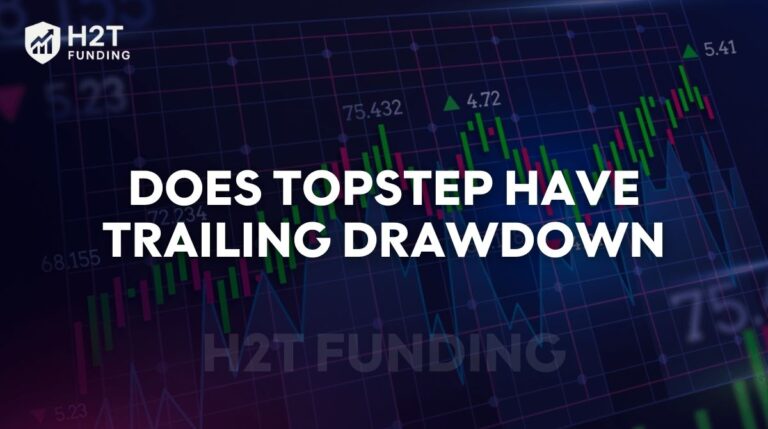If you’re asking, can you trade options on a funded account, without risking your personal capital, the landscape in 2026 offers a definitive ‘yes.’ This opportunity is more accessible and attractive than ever. As proprietary trading firms continue to expand their asset offerings, options traders now have the chance to access large pools of funding by simply proving their skill.
This guide will break down how funded options trading works, the advantages and pitfalls, key selection criteria for reputable firms, and a curated list of the best prop firms supporting options. Consider this your guide to trading options with institutional capital, confidently and profitably.
Whether you’re a beginner or a seasoned trader, this is your roadmap to trading options with someone else’s capital, confidently and profitably.
1. What is an options trading funded account?
An options trading funded account is a live trading account that lets you trade options using capital provided by a proprietary trading firm, not your own money. This means you can access tens of thousands of dollars in buying power once you’ve proven your skill through an evaluation phase.
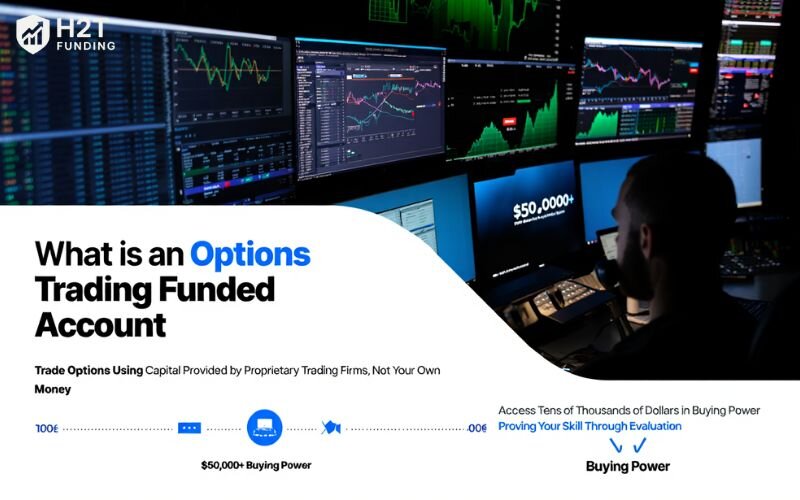
Think of it as a partnership: you bring the trading expertise, the firm brings the capital. When you profit, both parties share the rewards. Unlike personal accounts, where 100% of the risk is yours, a funded account limits your downside to just the upfront evaluation fee, while still offering real upside potential.
By removing the capital barrier, funded accounts create a lower-risk path for serious traders to grow their strategies. And for options traders, this model opens up a new world of opportunity with less financial pressure.
2. So, can you trade options on a funded account?
Yes, prop firms are increasingly opening their programs to options traders, allowing qualified individuals to access capital and trade at scale without using personal funds. The core goal of these firms is to identify traders who can generate consistent returns, regardless of the asset class.

While funded accounts were once dominated by forex and futures, the market is shifting. Many firms now recognize the strong demand and profit potential in options trading, especially stock options and futures options, and have expanded their supported instruments accordingly.
This evolution signals a real opportunity for options traders. If you have the skill and discipline to meet evaluation requirements, trading options on a funded account is not only possible; it’s rapidly becoming a viable path to scale your strategy.
3. How does trading options with a prop firm work?
Getting funded to trade options may sound complex at first, but the process is surprisingly structured. Most prop firms follow a clear, three-step model designed to identify skilled traders, allocate capital responsibly, and share profits fairly.
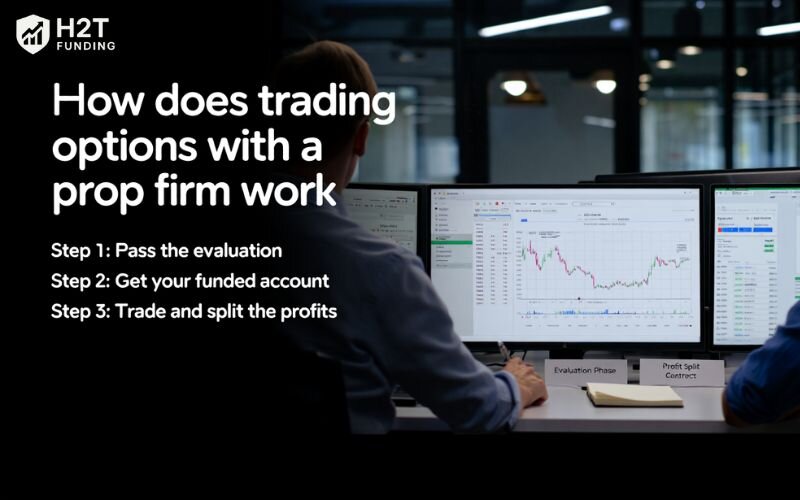
3.1. Step 1: Pass the evaluation
Before you can trade options with real capital, you must first prove your skills through an evaluation phase, commonly called a “challenge” or “assessment.” This is the firm’s way of ensuring you can trade profitably and responsibly under specific risk parameters.
Each firm sets its own rules, but the following criteria are typically required:
- Profit Target: You must reach a set return, often between 8% and 10%.
- Daily Loss Limit: You cannot lose more than a fixed amount per day, usually around 5% of the account value.
- Maximum Drawdown: Your total losses must not exceed 10%–12% of the starting balance.
- Minimum Trading Days: Most firms require you to trade actively over at least 5 calendar days to demonstrate consistency.
To participate, you’ll pay an evaluation fee, generally non-refundable if you fail. However, some firms offer fee refunds once you pass and get funded.
The evaluation step is not just a filter; it’s a test of discipline and consistency. Mastering this stage proves you’re ready to manage someone else’s capital with real risk controls in place.
Maybe you are interested in:
3.2. Step 2: Get your funded account
Once you pass the evaluation, you’ll receive a congratulatory email and an independent contractor agreement to sign. This contract formalizes your relationship with the prop firm and sets the terms for capital allocation, risk rules, and payouts.
After signing, you’ll gain access to a live trading account with the funded capital, often $25,000, $50,000, or more, depending on the program you selected. This is real money, not simulated.
Importantly, risk management rules from the evaluation phase will still apply. These safeguards protect the firm’s capital and reinforce disciplined trading behavior, essential for long-term success.
3.3. Step 3: Trade and split the profits
Now that you have access to real capital, your goal is simple: trade profitably and follow the firm’s rules. As you generate returns, the profits are shared between you and the prop firm based on a pre-agreed ratio.
A common profit split is 80/20, meaning you keep 80% of the profits while the firm takes 20%. Some firms even offer up to 90% for top performers or after a certain milestone.
Most firms pay out profits on a biweekly or monthly schedule. The payout process is usually automated, but some firms may require a request or verification step before release.
This stage is where the rewards come in, but only if you stay disciplined. Consistency, adherence to rules, and emotional control are key to maintaining your funded status and scaling further.
4. The pros and cons of using a funded account for options
Funded accounts offer a powerful pathway for options traders, but like any trading model, they come with both opportunities and trade-offs. Below is a breakdown of the major pros and cons to help you decide if this approach aligns with your strategy and personality.
4.1. The upsides: Why it’s a great opportunity
While it requires skill and discipline, the advantages of trading options with a funded account are significant, especially for traders who lack large personal capital.

- Access to significant capital: Instead of trading with your own $2,000, you can control $50,000 or even $100,000 in a funded account, amplifying your profit potential.
- High profit splits: Many firms allow you to keep 80%–90% of the profits you generate, without putting up your own capital.
- Structured trading environment: Clear rules around loss limits and risk exposure force you to adopt disciplined habits, which are critical for long-term trading success.
- No personal liability: Aside from the evaluation fee, you don’t risk your own money, even if your trades lose.
These benefits make funded accounts an attractive option for traders focused on performance over initial capital.
4.2. The downsides: What you need to watch out for
To give you a realistic picture, it’s crucial to understand the potential challenges that come with using a funded account.
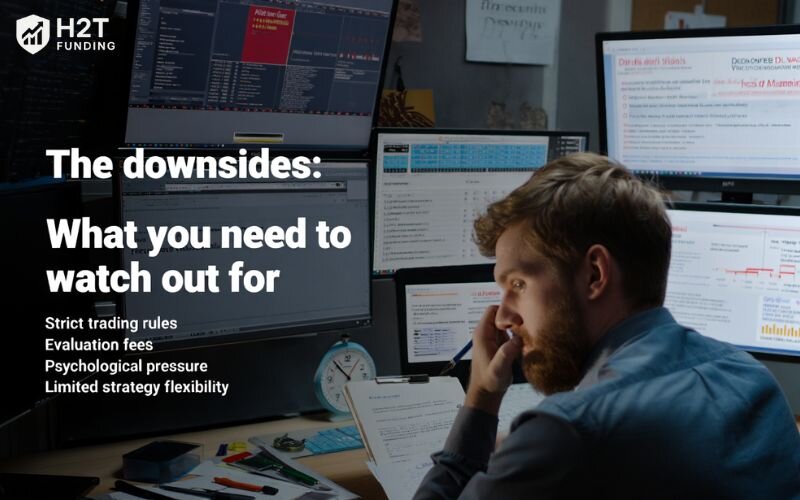
- Strict trading rules: Even a minor violation, like hitting a loss limit by a small margin, can void your account.
- Evaluation fees: You’ll need to pay upfront to attempt the evaluation. If you fail, that money is gone. It’s best to view this as the cost of entry for proving your skills.
- Psychological pressure: The stakes feel real. The pressure to pass the challenge and perform consistently on a live account can affect your decision-making.
- Limited strategy flexibility: Some firms restrict overnight trades, news events, or complex options strategies, which may limit your edge.
Understanding these drawbacks upfront allows you to prepare mentally and strategically, reducing surprises and setting realistic expectations.
5. How to choose the best prop firm for options trading
Not all prop firms are created equal, especially when it comes to options trading. Choosing the right firm can mean the difference between long-term growth and constant frustration. Below are five key factors you should evaluate before committing your time and money.
5.1. Evaluation rules and targets
The evaluation phase is where most traders succeed, or fail, so it’s critical to choose a firm with realistic rules that match your trading style.
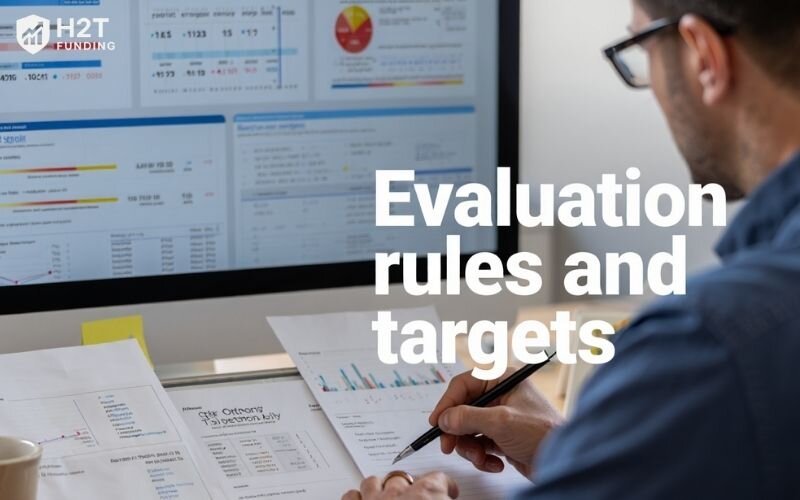
Some firms require aggressive profit targets (10%+) or allow very little drawdown, which can put unnecessary pressure on your strategy. Others offer more balanced expectations, like an 8% target with a 12% maximum drawdown and no daily loss limit.
Be sure to read the fine print: Can you reset your account? Are you penalized for early profit-taking? Do they allow options-specific metrics (e.g., Greeks risk limits)?
Ultimately, a fair evaluation should challenge your consistency, not force you to gamble.
5.2. Profit split and payout schedule
Profit sharing is a core part of any funded trading program, and understanding the fine details can protect your earnings.
Most prop firms offer an 80/20 split, meaning you keep 80% of your profits. Some firms go higher, up to 90%, especially after consistent performance or account scaling. While the split looks attractive, make sure there are no hidden fees or conditions that reduce your actual payout.
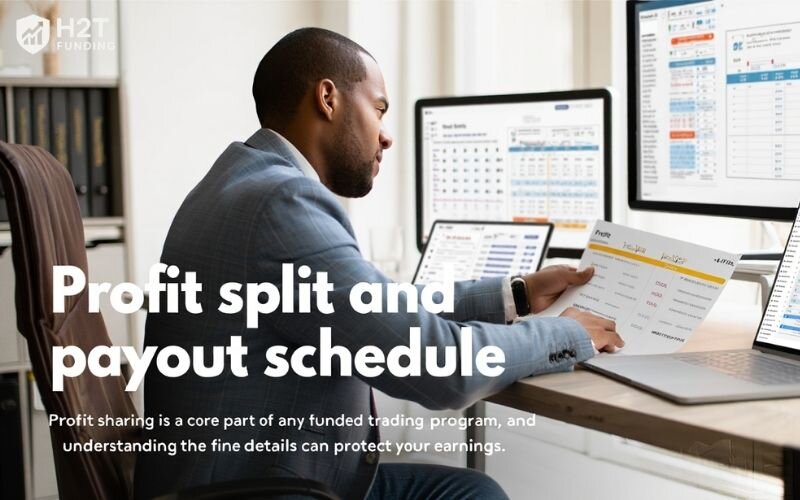
Also, review the payout frequency. Some firms pay weekly, others biweekly or monthly. Ask yourself: Do they require manual requests? Is there a minimum withdrawal threshold?
A good firm should make it easy to get paid, transparently and on time, so you can focus on what matters: trading profitably.
5.3. Trading platform and allowed strategies
Your trading performance can be heavily influenced by the platform you use, so compatibility matters.
Some prop firms support advanced tools like Thinkorswim, TradeStation, or Tastyworks, while others may require you to adapt to less flexible platforms. Before signing up, ensure the platform supports your preferred workflows, order types, and analytics tools.
Equally important are the strategy restrictions. Many firms place limits on holding positions overnight, during major news events, or using high-risk tactics like naked options selling. These rules can conflict with your style if you’re an options trader relying on multi-leg or longer-dated setups.
Choose a firm whose rules align with your trading edge, not one that forces you to compromise it.
Continue reading: What is a trading plan? A Beginner’s guide for success
5.4. Firm’s reputation and community support
A firm’s reputation is non-negotiable. When you’re committing your time and strategy, you need a trustworthy partner. That’s why reputation should be a top criterion.
Start by researching independent reviews on platforms like Trustpilot, Reddit, or YouTube. Look for patterns: Do traders complain about hidden rules, delayed payouts, or poor customer service? Or is the feedback consistently positive and transparent?

Strong firms often maintain active communities, like Discord or Slack groups, where traders can share insights, troubleshoot issues, and build connections. This kind of ecosystem shows the firm invests in long-term trader success, not just one-time evaluations.
A reputable firm with a supportive community increases your chances of sustained growth, not just short-term results.
5.5. Scaling plan for your account
A good prop firm doesn’t just fund you once; it rewards consistent performance by scaling your account over time.
Scaling plans allow traders who meet profit targets and follow rules to gradually manage larger amounts of capital. For example, if you start with $50,000 and maintain profitability over 2–3 months, some firms may increase your account to $100,000 or even $250,000.
Look for firms that clearly outline their scaling criteria, such as consecutive profitable months, drawdown limits, and minimum trading days. Avoid firms with vague promises or arbitrary reviews.
A transparent, well-defined scaling roadmap shows the firm is committed to growing with you, not just testing you once and moving on.
6. 3 best prop firms for options trading
With more firms recognizing the demand for options traders, the choices for getting a funded account are expanding fast. But not all prop firms offer the same terms, flexibility, or support.
If you’re asking, Can you trade options on a funded account and actually thrive?, these three firms stand out in 2026 for their strong reputation, trader-friendly rules, and proven track records.
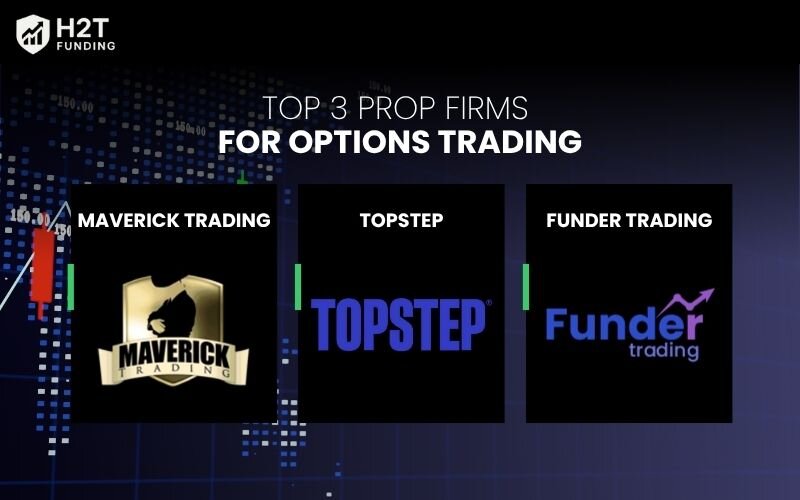
6.1. Maverick Trading: Best for structured training and stock options
Maverick Trading is one of the most established proprietary trading firms in the U.S., offering a professional pathway for traders who want to focus on stock options. It emphasizes long-term development through structured training, making it ideal for those who want more than just a funded account—they want a career in trading.
The firm’s model is different from challenge-based firms. You apply, complete an interview process, and go through training before receiving capital. While it may feel more corporate, the benefit is clear: mentorship, community, and clear growth paths.
This makes Maverick a strong fit for serious traders willing to commit to education in exchange for long-term backing.
| Feature | Description |
|---|---|
| Best For | Traders seeking structured training in stock options |
| Profit Split | Up to 80% |
| Capital Range | Typically starts at $10,000 – $25,000; scales with performance |
| Evaluation Model | No challenge; application, interview, and mandatory training program |
| Platform Support | Thinkorswim, proprietary platform |
| Allowed Assets | Stock options, equities |
| Community Support | Strong mentorship programs, trader forums, and a senior advisor system |
6.2. Topstep: Best for futures options trading
Topstep is a leader in the funded futures space, and now it’s expanding to include options on futures. With its signature “Trading Combine” evaluation and emphasis on discipline, Topstep is ideal for traders who focus on liquid futures markets and want access to capital quickly.
The firm is known for transparency, fast payouts, and excellent trader support. While options capabilities are still growing, Topstep already stands out by allowing traders to combine futures and options strategies, a major plus for those who hedge or use spreads.
If you specialize in futures options, this is one of the most reputable names to consider.
| Feature | Description |
|---|---|
| Best For | Futures options traders |
| Profit Split | Up to 90% |
| Capital Range | From $50,000 to $150,000 |
| Evaluation Model | Trading Combine – pass a two-step simulated challenge |
| Platform Support | NinjaTrader, TradingView, Rithmic |
| Allowed Assets | Futures, options on futures |
| Payout Frequency | Weekly or biweekly |
| Community Support | Active blog, educational content, Discord community |
6.3. Funder Trading: Best for educational resources and flexibility
Funder Trading sets itself apart with a unique model focused on direct funding for stock and options traders, eliminating the need for upfront capital to cover evaluation fees.
While a newer name compared to industry giants, its primary strength lies in an extensive educational ecosystem, including a custom analytics dashboard, daily live trading rooms, and personalized coaching.
The firm’s approach is ideal for traders who want to pay the startup fee from their initial profits, not out of pocket. This makes it a compelling choice for those who prioritize mentorship and skill development alongside immediate access to a funded account.
| Feature | Description |
|---|---|
| Best For | Traders seeking educational support and flexible trading rules |
| Profit Split | 100% of initial profits until the startup fee is covered, then an 80/20 split. |
| Capital Range | From $25,000 to $200,000 |
| Evaluation Model | Direct Funding Model: no upfront evaluation fee. A one-time startup cost is paid from the trader’s first profits. |
| Platform Support | MetaTrader 5, TradingView, proprietary web platform |
| Allowed Assets | Stocks and options only. |
| Payout Frequency | Biweekly or monthly, depending on account type |
| Community Support | Daily live trading rooms, 80+ hours of educational content, personalized coaching, and a Chicago-based help desk. |
Discover more related articles:
7. FAQs: Your questions about options, funded accounts answered
Generally, no. The standard industry path to a funded account involves passing an evaluation to demonstrate your skill and discipline.
Not all strategies are allowed. Many prop firms restrict high-risk tactics like naked option selling or holding through major news events. Always review the firm’s rulebook to ensure your strategy is permitted.
Yes, many do, especially as demand grows in 2026. While not every prop firm supports options, the number of firms offering options trading funded accounts is increasing rapidly.
8. Conclusion
To return to our original question: Can you trade options on a funded account? The answer in 2026 is a resounding yes. For skilled traders who have a proven strategy but lack significant capital, this model offers a powerful path to professional growth without risking personal savings.
But success doesn’t just come from being funded. It depends on your trading skill, discipline, and choosing a prop firm that truly aligns with your strategy.
Ready to take the next step? Explore our other in-depth articles on Prop Firm & Trading Strategies section of H2T Funding to refine your edge and confidently prepare for your evaluation.





